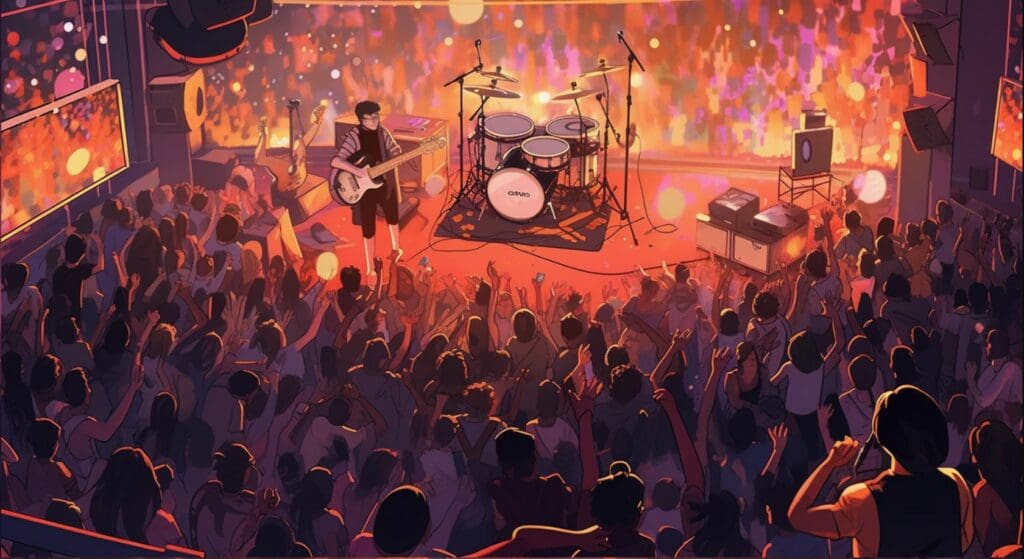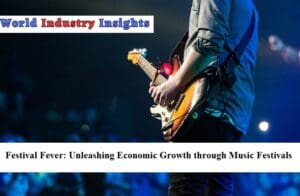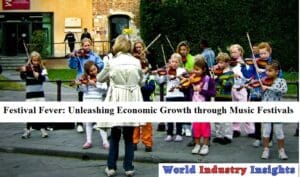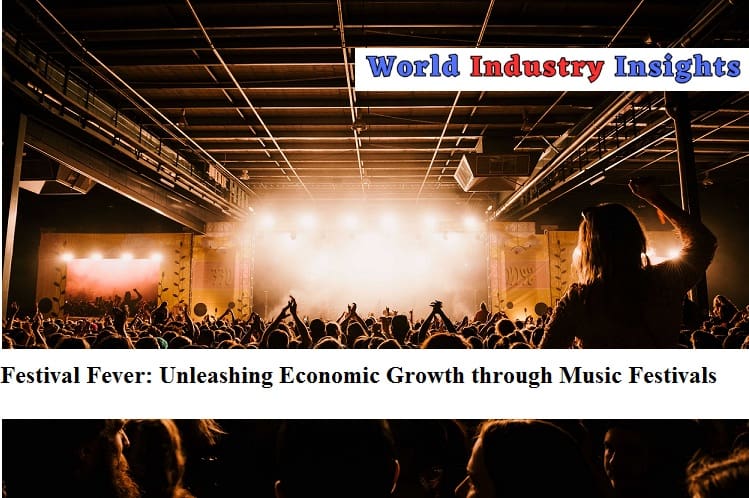Festival Fever: music festivals have emerged as cultural phenomena celebrated worldwide, captivating audiences with their vibrant energy and diverse lineup of artists. Beyond their role as epicenters of music and art, these festivals wield significant economic power, creating a ripple effect that impacts local economies, tourism, and communities.
From the direct economic impact of ticket sales and merchandise revenue to the indirect effects on tourism, accommodations, and job creation, music festivals have become powerful catalysts for economic growth. Additionally, they foster social cohesion, promote cultural exchange, and provide platforms for artists and performers to showcase their talents. In this blog post, we will delve into the economic impact of music festivals, exploring their multifaceted contributions to the global and local economy.

The Rise of Music Festivals:
Music festivals have experienced a remarkable surge in popularity over the past few decades, becoming cultural phenomena celebrated worldwide. These events bring together music enthusiasts, artists, and diverse communities in a unique celebration of music and art.
The Power of Music as an Economic Driver:
Music holds a special place in society, not just for its cultural and emotional value but also for its significant economic impact. Music festivals, in particular, have emerged as powerful economic drivers, stimulated local economies and contributed to tourism, employment, and community development.
Understanding Music Festivals:
Definition and Characteristics of Music Festivals:
Music festivals can be defined as large-scale events that showcase live performances by a variety of artists and bands across different genres. These festivals are typically held over multiple days, attracting a significant audience. B. Types of Music Festivals:
Genre-Specific Festivals:
Genre-specific festivals focus on a particular music genre, catering to specific fan bases. Examples include rock festivals like “Rock in Rio” and electronic music festivals like “Electric Daisy Carnival.”
Multi-Genre Festivals:
Multi-genre festivals offer a diverse lineup of artists spanning various genres, appealing to a broader audience. Festivals like “Lollapalooza” and “Bonnaroo” are known for their eclectic mix of music styles.
Local, National, and International Festivals:
Music festivals can vary in scale and reach. Local festivals primarily cater to regional audiences, while national and international festivals draw attendees from across the country or even around the world. Examples include the “New Orleans Jazz & Heritage Festival” and “Primavera Sound” in Barcelona.

The Economic Significance of Music Festivals: A. Direct Economic Impact:
Ticket Sales and Revenue Generation:
Ticket sales form a significant portion of a music festival’s revenue. Festivals like “Coachella” and “Glastonbury” sell out within minutes, generating substantial income from ticket purchases.
Merchandise Sales and Brand Partnerships:
Music festivals offer a platform for merchandise sales, including clothing, accessories, and memorabilia. Brand partnerships and sponsorships also contribute to the festival’s revenue stream, with companies seeking to align themselves with the festival’s brand and reach a targeted audience.
Indirect Economic Impact:
Tourism and Accommodation:
Music festivals attract a considerable number of out-of-town visitors, resulting in increased tourism and the need for accommodations. Attendees often book hotels, vacation rentals, or campgrounds, providing a boost to the local hospitality sector.
Transportation and Infrastructure:
As festival-goers travel to the event location, there is a rise in demand for transportation services, including flights, trains, buses, and rideshares. Additionally, festivals often require infrastructure improvements, such as stage setups, sound systems, and temporary facilities, which stimulate the local construction and service sectors.
C.Employment and Job Creation:
Artists and Performers:
Music festivals create employment opportunities for artists and performers, ranging from well-established headliners to emerging acts. These artists are hired to entertain audiences and contribute to the festival’s lineup, driving the local music industry.
Festival Organizers and Staff:
Behind the scenes, festival organizers, production crews, event planners, security personnel, and other staff members are employed to ensure the smooth execution of the festival. These jobs provide both temporary and long-term employment opportunities.
Local Businesses and Vendors:
Music festivals create a ripple effect on local businesses and vendors. Food and beverage vendors set up stalls, offering a variety of culinary options to festival-goers. Merchandise vendors, such as clothing, accessories, and art sellers, also benefit from increased foot traffic. Additionally, local businesses providing services like transportation, printing, and event supplies experience a surge in demand during the festival period.
IV. Boosting Local Economies:
A. Destination Marketing and Branding:
Music festivals serve as powerful tools for destination marketing, putting host cities or regions on the global map. The association of a festival with a location can attract tourists and enhance its reputation as a vibrant cultural hub.
B. Supporting Local Businesses and Entrepreneurs:
Food and Beverage Vendors:
Music festivals provide an excellent platform for local food and beverage vendors to showcase their products and gain exposure. This exposure can lead to increased sales, brand recognition, and future business opportunities.
Accommodation Providers:
The influx of festival-goers creates a surge in demand for accommodations, benefiting local hotels, guesthouses, and rental properties. It provides an opportunity for these establishments to generate revenue during peak festival periods.
Transportation Services:
Music festivals often require efficient transportation services to cater to attendees’ needs. Local transportation providers, such as taxis, rideshares, and public transport systems, experience increased business during festival dates.
Retailers and Merchants:
Local retailers and merchants can take advantage of the festival buzz by offering festival-related products, such as clothing, accessories, and music-related merchandise. The increased foot traffic and heightened spending contribute to the local economy.
Revenue for Municipalities:
Taxes and Licensing Fees:
Music festivals generate revenue for municipalities through various means, including taxes on ticket sales, merchandise sales, and accommodation bookings. Additionally, festival organizers often pay licensing fees and permits to ensure compliance with local regulations.
Community Development and Improvement:
The revenue generated from festivals can be reinvested in community development initiatives. Municipalities can allocate funds towards improving local infrastructure, supporting arts and cultural programs, and enhancing public spaces, benefiting both residents and future festival attendees.

The Ripple Effect on Tourism:
Attracting Domestic and International Visitors:
Music festivals have the power to draw attendees from both domestic and international locations. Festivals with a strong reputation, like “Tomorrowland” and “Burning Man,” can attract visitors from around the globe, creating a significant tourism influx.
Extending Stays and Increasing Spending:
Music festivals often have a duration of several days, encouraging visitors to extend their stays in the host city or region. This extended period allows for additional spending on accommodations, dining, shopping, local attractions, and other experiences, further boosting the local economy.
Showcasing Local Culture and Attractions:
Music festivals provide an ideal platform to showcase the host location’s unique culture, heritage, and attractions. Attendees are exposed to local artists, cuisines, traditions, and tourist sites, promoting cultural exchange and generating interest in future visits.
Community and Social Impact:
Cultural Exchange and Social Cohesion:
Music festivals foster cultural exchange by bringing together individuals from diverse backgrounds, cultures, and regions. These events provide a platform for shared experiences, artistic collaborations, and the celebration of cultural diversity, promoting understanding and unity among attendees.
Fostering a Sense of Belonging and Identity:
Music festivals create a sense of belonging and pride within local communities. The presence of a festival puts the spotlight on the host location, generating a collective pride and identity among residents, who see their city or region showcased on a global stage.
Promoting Arts and Music Education:
Music festivals often incorporate educational elements, such as workshops, panel discussions, and mentorship programs, offering valuable opportunities for aspiring musicians and artists. These initiatives promote arts and music education, nurturing talent and enriching the local creative community.
Challenges and Considerations:
Environmental Impact and Sustainability:
Large-scale music festivals can have significant environmental footprints. Issues such as waste management, energy consumption, and carbon emissions need to be addressed through sustainable practices and eco-friendly initiatives.
Noise and Traffic Management:
Festivals held in urban or residential areas may pose challenges related to noise pollution and traffic congestion. Implementing measures to mitigate noise levels and manage traffic flow is crucial to maintaining a positive relationship with local communities.
Balancing Local and Tourist Interests:
Music festivals can sometimes disrupt the daily lives of local residents, creating tension between the needs and interests of residents and festival-goers. Finding a balance that considers the well-being of both groups is essential for maintaining harmonious community relations.
Accessibility and Inclusivity:
Ensuring accessibility and inclusivity for all individuals, including those with disabilities and diverse backgrounds, is essential. Music festivals should provide accessible facilities, consider different cultural sensitivities, and promote a welcoming and inclusive environment for everyone.
Case Studies:
Coachella Valley Music and Arts Festival:
Coachella, held annually in California, has grown into one of the world’s most iconic music festivals, attracting global attention and generating significant economic impact for the Coachella Valley region.
Glastonbury Festival:
Glastonbury, a legendary festival in the UK, showcases diverse music genres and has become an emblematic event known for its cultural influence and positive economic effects on the local community.
Tomorrowland:
Tomorrowland, held in Belgium and other global editions, is renowned for its immersive experience and impact on tourism, showcasing the economic potential of electronic dance music festivals. D. South by Southwest (SXSW): SXSW in Austin, Texas, has become a major gathering for music, film, and technology, contributing to the city’s economic growth and reputation as a hub for creative industries.
Future Trends and Innovations:
Virtual and Hybrid Music Festivals:
The advent of technology has opened doors to virtual and hybrid festival formats. These innovative approaches allow for global participation, increased accessibility, and new revenue streams through digital platforms.
Integration of Technology and Experiential Marketing:
Technology plays an increasingly vital role in enhancing the festival experience. Innovations such as interactive installations, augmented reality (AR), virtual reality (VR), and personalized experiences drive attendee engagement and expand economic opportunities for festival organizers and partners.
Diversification of Festival Offerings:
To appeal to evolving audience preferences, festivals are diversifying their offerings beyond music. Incorporating art installations, culinary experiences, wellness activities, and immersive cultural programs creates a more comprehensive and engaging festival experience, attracting a broader audience and driving economic growth.
Conclusion of Festival Fever
Recap of the Economic Impact of Music Festivals:
Summarizing the various ways in which music festivals contribute to economic growth, job creation, tourism, and community development.
The Role of Music Festivals in Local and Global Economies:
Emphasizing the broader significance of music festivals as catalysts for economic activity and their ability to stimulate local economies while influencing global cultural landscapes.
The Importance of Preserving and Supporting Music Festival Culture:
Recognizing the cultural and social value of music festivals and advocating for their preservation, support, and responsible growth as vital components of our artistic and economic ecosystem.
FAQs:
Q: What is the economic impact of music festivals?
A: Music festivals have a significant economic impact by generating revenue through ticket sales, merchandise sales, and brand partnerships. They also contribute to tourism, job creation, and community development.
Q:How do music festivals boost local economies?
A: Music festivals boost local economies by attracting visitors who spend on accommodations, dining, shopping, and local attractions. They also support local businesses such as food vendors, accommodation providers, transportation services, and retailers.
Q: What is the role of music festivals in tourism?
A: Music festivals attract domestic and international visitors, extending their stays and increasing spending in the host location. They also showcase local culture, attractions, and foster tourism growth.
A: Music festivals promote cultural exchange, social cohesion, and a sense of belonging within communities. They also contribute to arts and music education, fostering creativity and identity.
Q: What challenges do music festivals face?
A: Music festivals face challenges such as environmental impact, noise and traffic management, balancing local and tourist interests, and ensuring accessibility and inclusivity for all attendees.
Q: What are the future trends in music festivals?
A: Future trends include the emergence of virtual and hybrid music festivals, integration of technology and experiential marketing, and the diversification of festival offerings beyond music to provide immersive experiences and attract a broader audience.
Our Reader’s Queries
What are the symptoms of the festival flu?
Festival flu is typically characterized by a range of symptoms, including coughing, sore throat, sneezing, runny nose, watery eyes, fever, and body aches. These symptoms can be quite uncomfortable and can make it difficult to enjoy the festivities. If you suspect that you have festival flu, it’s important to take steps to manage your symptoms and prevent the spread of the virus to others. By staying hydrated, getting plenty of rest, and practicing good hygiene, you can help to minimize the impact of festival flu on your health and well-being.
How long does festival fever last?
After attending a festival, individuals may experience symptoms such as cough, congestion, and flu-like symptoms. These typically arise a few days after the event and can last up to a week. If the symptoms persist beyond this timeframe, it is recommended to seek advice from a healthcare professional.
What is the post festival illness?
The festival flu is a common ailment that can strike after spending a week or two at a festival. It can leave you feeling terrible and in need of immediate medical attention. This condition is usually caused by a combination of factors, including lack of sleep, poor nutrition, and pushing your body to its limits. To avoid falling victim to the festival flu, it’s important to take care of yourself and prioritize your health during these events.
Is it normal to feel sick after a concert?
It’s common to feel drained the day after a night of singing and being in a crowd. Research has revealed that attending concerts can lead to inflammation of the airways. This is due to exposure to loud noise and an increase in airborne particles like dust or smoke.

